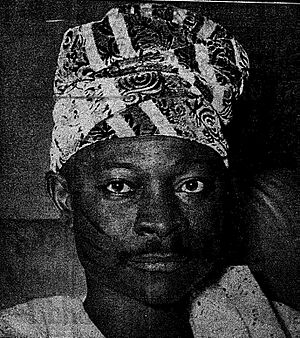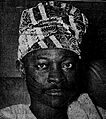Adegoke Adelabu facts for kids
Quick facts for kids
Adegoke Adelabu
|
|
|---|---|
 |
|
| Opposition Leader Western House of Assembly | |
| In office 1956–1958 |
|
| Chairman of Ibadan District Council | |
| In office 1954–1956 |
|
| Federal Minister of Natural Resources and Social Services | |
| In office January 1955 - January 1956 |
|
| Personal details | |
| Born | 3 September 1915 Ibadan |
| Died | 25 March 1958 (aged 42) |
| Political party | NCNC |
Gbadamosi Adegoke Adelabu (born September 3, 1915 – died March 25, 1958) was a very important person in the politics of Ibadan city. Later, he became a key figure in the Western Region of Nigeria. This was just before Nigeria became an independent country in 1960.
He served as Nigeria's Minister of Natural Resources and Social Services from January 1955 to January 1956. After that, he became the leader of the opposition in the Western Regional Assembly until he passed away in 1958. Adelabu came from a humble family but worked hard to become a powerful leader in Nigerian politics. He went to Government College, Ibadan and later became a businessman. His successful political journey ended too soon when he died in a car accident, not long before Nigeria gained independence from Britain.
Adelabu believed strongly in national unity and a type of government that helps everyone. He was known for his strong opinions and belief in himself.
Contents
Early Life and Education
Adegoke Adelabu was born on September 3, 1915. His parents were Sanusi Ashinyanbi and Awujola Adelabu. Sadly, his mother passed away when he was very young. His aunt then raised him.
From 1925 to 1929, he went to St David's C.M.S. School in Ibadan. He finished his primary education at C.M.S. Central School, Mapo. Even though Adelabu was Muslim, his aunt wanted him to get a Western education. At that time, Christian schools were the main option in Ibadan. So, she got him a baptismal certificate, which allowed him to attend the CMS schools.
From 1931 to 1936, he attended Government College, Ibadan, where he completed his secondary education. He was even the head boy of the school. In 1936, he passed the entrance exam for Yaba Higher College. He also won a scholarship from UAC to study business there. However, he left the college after six months without using the scholarship.
Career and Business Ventures
UAC offered Adelabu a job as an assistant to their Ibadan district manager. His first task was to visit the cocoa farming areas of Ibadan province. After his tour, he suggested new ways to organize cocoa distribution and trade. This report helped him get promoted to assistant produce manager at UAC.
However, Adelabu left UAC in 1937 to start his own business in the produce trade. This venture was not successful. He then looked for a government job. In 1939, he became an agricultural inspector. Later, he supervised a cooperative society. He worked there until 1945, when he returned to UAC. His second time at UAC was successful. But after his mentor, the Ibadan District Manager, left, Adelabu also left the company. He then used the money he earned from UAC to start a textile trading business in Ibadan.
At that time, the local government in Ibadan, called the Native Authority system, was mostly run by chiefs and family heads who could not read or write. Adelabu became interested in becoming an Administrative Secretary for the local council because he was educated.
Political Journey
Starting in Politics (1949–1953)
Adelabu's political career began when he supported a group of junior chiefs and family heads. They were protesting against a powerful businessman named Salami Agbaje. Adelabu was known for being smart and educated. This made the chiefs notice him, as they needed someone to help them write letters and articles to share their views. Adelabu agreed, hoping to get the job of Administrative Secretary.
Salami Agbaje was a rich businessman and a traditional leader in Ibadan. Some chiefs did not like him, partly because many of them owed him money. They started a campaign to remove him from his position. Adelabu actively helped this movement by writing articles and assisting with the petition sent to the British colonial rulers.
During this time, Adelabu became the secretary of Egbe Omo Ibile. This was the main group against Agbaje. When the colonial authorities looked into the case, they advised Agbaje to step back from the local council. They also made big changes, like separating the Oshun division from Ibadan province. Many Ibadan groups were not happy with these changes. So, several groups decided to join forces to protect Ibadan's interests.
Forming New Parties
In the local elections of 1951, Adelabu's Egbe Omo Ibile, along with Augustus Akinloye and a youth group, formed the Ibadan People's Party. This party aimed to challenge the older political groups. Adelabu used the feelings against people from Ijebu (another ethnic group) among Ibadan residents to gain support. This was especially true after the loss of the Oshun division, which leaders from the Action Group party had supported.
The new Ibadan People's Party won all six seats in the Western Regional Assembly. However, an agreement Adelabu had made to support the NCNC party fell apart. Four of the elected members joined the Action Group instead. Adelabu then became more involved in organizing the NCNC in Ibadan. He became the secretary of the party's Western Province Working Committee. He gained recognition within the party because he was the only Ibadan People's Party lawmaker who stayed with the NCNC.
His reputation grew quickly across the country. In 1952, he published a book called Africa in Ebullition, which explained his political ideas. To create a strong group to challenge the Action Group in the 1954 elections, Adelabu formed a new organization called the Ibadan Taxpayers Association. This group aimed to attract many followers by focusing on tax reform. This group then joined with a farmers' group called Maiyegun to form the Mabolaje Grand Alliance.
Leading the Opposition (1954–1958)
Adelabu and his group became a strong opposition to the local council, which was controlled by the older parties. He spoke out against the council's tax reforms and the role of traditional family heads in government. He presented himself as a supporter of traditional authority and values.
In the local elections of 1954, his alliance won most of the seats in the Ibadan District Council. This allowed Adelabu to become the district chairman. He also became the chairman of the Finance Committee and other important committees. In the federal elections that same year, Adelabu also won a seat in the House of Representatives. His party won most seats in the House of Representatives. He later became the First National Vice President of the NCNC. He was also appointed Minister of Social Services. He held both positions from January 1955 to January 1956.
In 1955, Adelabu's administration faced an investigation into claims of wrongdoing in the district council. This investigation was set up by the Western Regional government, which was controlled by the Action Group. He stepped down from both his positions after the investigation's report. J.M. Johnson replaced him as Minister of Social Services.
In 1956, Adelabu ran for a seat in the regional assembly again, this time as the leader of the NCNC in the Western region. He hoped to lead his party to victory. However, his party lost most seats to the Action Group. Adelabu then became the leader of the opposition in the Western House of Assembly.
After this loss, Adelabu tried to create a new Yoruba Central State from the Western Region. This new state would include areas where the NCNC was strong, like Oyo, Ibadan, and Ondo provinces. However, this idea was rejected in 1958 because it seemed to be based mostly on party lines. In 1958, Adelabu also disagreed with the leadership of Azikiwe. Azikiwe supported a national government that included the Action Group, NCNC, and NPC parties. Adelabu did not like the idea of including the Action Group, calling it an "unholy alliance."
Death
Adelabu died on March 25, 1958, near Shagamu, on the Lagos–Ibadan Expressway. He was returning from Lagos with a Syrian businessman when their car crashed into another vehicle.
Peculiar Mess
Adegoke Adelabu is famous in Yorùbá and Nigerian history for a special phrase: "penkelemesi". This word is a Yoruba version of the English phrase, "peculiar mess." Adelabu, who was known for his excellent English, used this phrase once to describe the opposition in the Western Region House of Assembly. People in his audience who did not understand English changed the phrase into their local language, calling it "penkelemesi."
Images for kids


